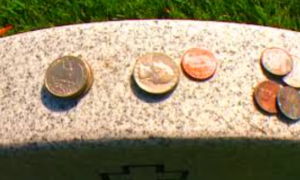Losing a loved one is always a challenging experience. Some individuals cope with their grief by creating elaborate tributes, such as floral arrangements or even offerings of food and drinks.
However, placing coins on gravestones is a particularly meaningful tradition, especially for military personnel and veterans, with deep significance for their families.
What is the Purpose of Placing Coins on Gravestones?
The exact roots of the tradition of laying pennies on gravestones are not completely known. Some argue, for example, that the tradition began in the Roman Empire. However, “there is no reason to believe that it does,” according to Snopes. due to “insufficient documentation.” Regardless of the situation, one thing is definite. Individuals who have a strong affection for them and those who are in the military make sacrifices that are difficult for most individuals to comprehend.
Therefore, it is no surprise that those who have worked together would find a method to honor those who have died. There are speculations that the tradition of laying pennies on gravestones originated during the Vietnam War. It appeared more secure for individuals to communicate with one another when coins were put on gravestones.
“According to a page on the American Legion website, leaving a coin was seen as a more practical method of indicating that you had visited a soldier’s grave, as opposed to contacting the soldier’s family. This was because engaging in a conversation with the family could potentially lead to an uncomfortable argument about the political aspects of the war, given the divided opinions in the country.”
Symbolically Demonstrating Respect
Additionally, the tradition of depositing money on gravestones began as a way for troops to honor their “fallen comrades” or “treat them to a drink.” Curiously, each coin carries a unique significance.
For instance, the existence of a penny suggests that someone was present. However, a nickel symbolizes the person who left the memento and the person who passed away were both in boot camp, which gives it a somewhat more emotional meaning.
The dime symbolizes collaboration, even if it is just for a little period before being exchanged; the quarter, maybe the most intimidating coin, symbolizes a memorial. The quarter indicates to the deceased person’s family that the individual who left the memento was indeed there at the time of their death.
Additional Military and Financial Customs

It’s worth mentioning that challenge coins are also a popular military tradition, thus laying money on soldiers’ gravestones is not the sole ceremony involving money or even “coins.” While there are already themed and customized coins available, they had a significant impact on US military customs during World War One. The tradition is meant to symbolize the unity of everyone who has served. They have no monetary value, even yet they hold great significance and represent something extraordinary.
However, coins are used in several cultural customs as a symbol of fulfilling wishes, a representation of good luck, and a token of generosity for newly married couples. Furthermore, there are historical records of individuals being buried with their wealth. For example, there are no coins on the tombstone of Abraham Lincoln. Instead, it is reported that he was buried with two dollars and fifty cents over his eyes.
In many civilizations, coins have been used as a sign of prestige and good fortune for different reasons. While it is uncertain whether the tradition of placing pennies on gravestones was influenced by the symbolism of money, it signifies a connection that is far more profound than what most individuals can comprehend. a way of informing people that the efforts made by individuals serving in the military and their families are not overlooked.
